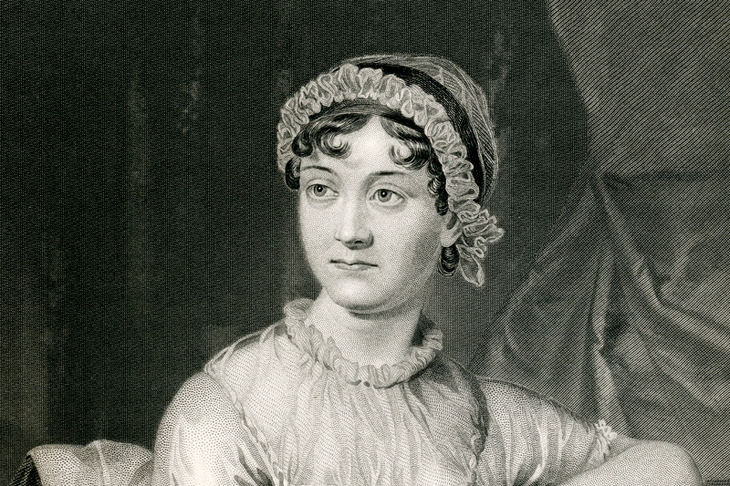Writing to her sister Cassandra about Pride and Prejudice in January 1813, Jane Austen declared, in a parody of Walter Scott: ‘I do not write for such dull Elves/As have not a great deal of Ingenuity themselves.’ That identification of the good Austen reader as one continually on the qui vive, ready to piece out the novels’ nudges, winks and silences, also underpins Helena Kelly’s ambitiously revisionist new study of Austen — a study that is by turns illuminating, provocative and infuriating. ‘We’re missing something,’ she argues with reference to Northanger Abbey. That sentence, both in its content and in the position it adopts with relation to its readers, could stand as a motto for the whole of the book, both its strengths and its weaknesses. Kelly offers a salutary argument for reading Austen’s novels with the serious attentiveness they invite and deserve, but frequently overstates the condition of collective intellectual somnolence from which she’s trying to rescue us.
Austen’s works are particularly fitted for the kind of treatment that Kelly gives them, since, when set alongside many later 19th-century novels, they might appear comparatively light on direct historical and political references: the Jacobite rebellions and Chartist agitations that feature in Scott and Gaskell are noticeable by their absence. However, Austen criticism has long since ceased to treat these absences as signs that the novels are uninterested in the upheavals of the times in which they take place; rather, these are texts that trust their original readers to pick up on the ways in which the most oblique glance at the world beyond the fiction — a volume of Cowper, say, or a bottle of Madeira — can let much larger cultural stories into the frame.
So far so good, and the strongest parts of Kelly’s study come in her eagle-eyed revisitings of the novels. Picking up on the fact that Northanger Abbey ‘offers us no fewer than three bedroom scenes, all of them lengthy’, she suggests that the true horrors lurking in the novel’s margins may be the potentially mortal risks of sexuality and childbirth (‘Catherine might learn to value a library more for the medicines it sells — Balm of Gilead, the “female pills” that promise to “restore” the menstrual cycle — than the mere novels’).
Likewise, Kelly takes the prominence of the word ‘prejudice’ in Pride and Prejudice — a word which would, indeed, have carried a particular charge for readers familiar with Edmund Burke and William Godwin after the 1790s — as her cue to explore an ‘upstart’ ascendancy challenging the established ranks in the novel:
Elizabeth’s dutifulness as a daughter… her lack of respect for Lady Catherine de Bourgh, they’re all of a piece. Elizabeth is, in short, constructed to be a conservative’s nightmare.
It is a mark of Kelly’s achievement here that her readings are pertinent even if one doesn’t wholly agree with them, since anything that sends a reader back to the detail of a novel in such a spirit is to be welcomed.
However, this is not the only mode in which the book works. For one thing, Kelly’s chapters begin with vignettes of biographically derived fiction which look back to Peter Ackroyd’s Dickens and, more directly, to David Nokes’s 1997 Jane Austen. It’s a legitimate move, but it’s hard to see how much it contributes to the overall effect of this book. Moreover, we are also given those moments which fictionalise acts of creation and inspiration (‘She pours ink into her inkwell, spilling out the letters of her name’), which always resemble the cliché in rock biopics when someone happens to stumble upon the melody of the band’s ‘greatest hit’.
The real problem, though, is the remit which Kelly’s book claims for itself. For sure, this is a study which pitches itself to a broad, non-specialist readership; but the tone of Jane Austen: The Secret Radical often implies that its insights are more ‘radical’ than they really are. A good measure of this is the work the pronoun ‘we’ is made to do. ‘We know wrong’; ‘we all know that Pride and Prejudice is a happy cheerful book’. There’s a historical elasticity to the way in which ‘we’ works in Kelly’s prose, with the result that it’s not always certain whether the interpretative infelicities she diagnoses are the fault of the present ‘we’ or of all misguided Austen critics until now.
Kelly’s obvious culprits are the agents of the Austen industry, that heritage-industrial complex which transfigures radical art into tea towels and novelty mugs, but it is not obvious how her grievance is only a modern one. ‘Her books are, as she meant them to be, read and enjoyed by precisely the sort of people she disliked’: those aren’t the words of a clever modern critic, but of D. W. Harding writing in Scrutiny in 1940, and this gets to the heart of the problem with the rhetorical force of ‘we’ in Kelly’s argument. The whole complex history of Austen’s modern reception (in which she has frequently been claimed as a not-so-secret radical, not least by the suffragettes) is compressed into a naïve ‘we’, ripe for deliverance from all the old illusions, even if those illusions are no longer prevalent.
In this light, it is appropriate that Kelly should reserve so much of her anger for adaptations that get in the way of the original texts. After reading this book, I certainly wasn’t thinking about Austen films, yet I did have another cinematic image lurking all too prominently in my mind: that of Morpheus offering Neo the red pill in The Matrix. ‘If you want to stay with the novels and the Jane Austen you know, then you should stop reading now. If you want to read Jane as she wanted to be read… read on.’ A study which offers such smart close observation of Austen should not have so insistently to tell its readers to ‘Wake up, sheeple’.






Comments